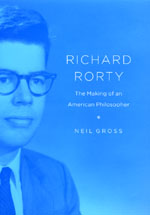The self-concept of Richard Rorty
 Scott McLemee interviewed Neil Gross yesterday for his “Intellectual Affairs” column at Inside Higher Ed. Gross is the author of Richard Rorty: The Making of an American Philosopher and he discusses his new book as a work in the sociology of ideas, not just biography and intellectual history. What’s the cash value of doing that? Gross explains:
Scott McLemee interviewed Neil Gross yesterday for his “Intellectual Affairs” column at Inside Higher Ed. Gross is the author of Richard Rorty: The Making of an American Philosopher and he discusses his new book as a work in the sociology of ideas, not just biography and intellectual history. What’s the cash value of doing that? Gross explains:
My goal in this book was not simply to write a biography of Rorty, but also to make a theoretical contribution to the sociology of ideas. Surprising as it might sound to some, the leading figures in this area today—to my mind Pierre Bourdieu and Randall Collins—have tended to depict intellectuals as strategic actors who develop their ideas and make career plans and choices with an eye toward accumulating intellectual status and prestige. That kind of depiction naturally raises the ire of those who see intellectual pursuits as more lofty endeavors….
I argue that intellectuals do in fact behave strategically much of the time, but that another important factor influencing their lines of activity is the specific “intellectual self-concept” to which they come to cleave. By this I mean the highly specific narratives of intellectual selfhood that knowledge producers may carry around with them—narratives that characterize them as intellectuals of such and such a type.
In Rorty’s case, one of the intellectual self-concepts that came to be terribly important to him was that of a “leftist American patriot.” I argue that intellectual self-concepts, thus understood, are important in at least two respects: they may influence the kinds of strategic choices thinkers make (for example, shaping the nature of professional ambition), and they may also directly influence lines of intellectual activity. The growing salience to Rorty of his self-understood identity as a leftist American patriot, for example, was one of the factors that led him back toward pragmatism in the late 1970s and beyond.
Navigate to Insidehighered.com to read the rest of the interview. Also read an excerpt from the book.